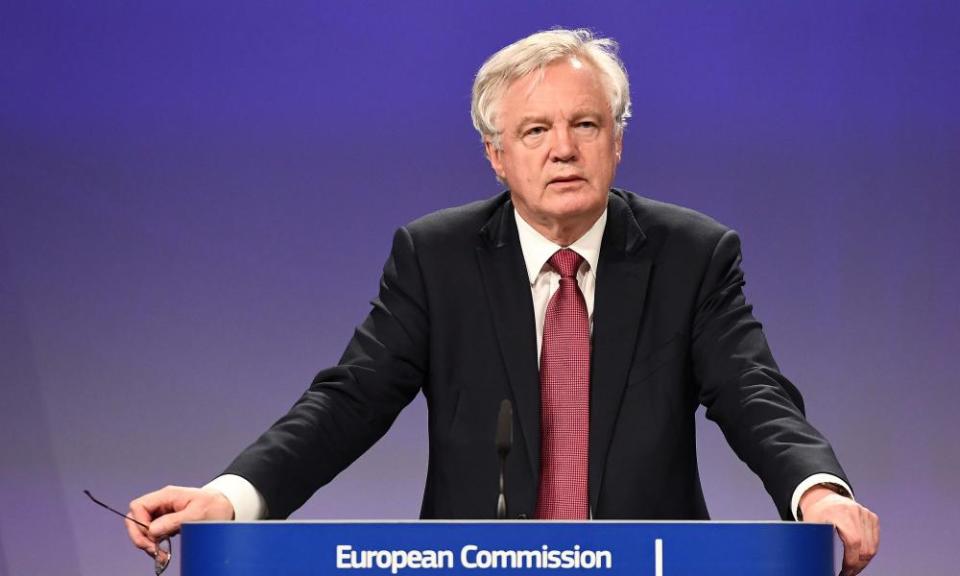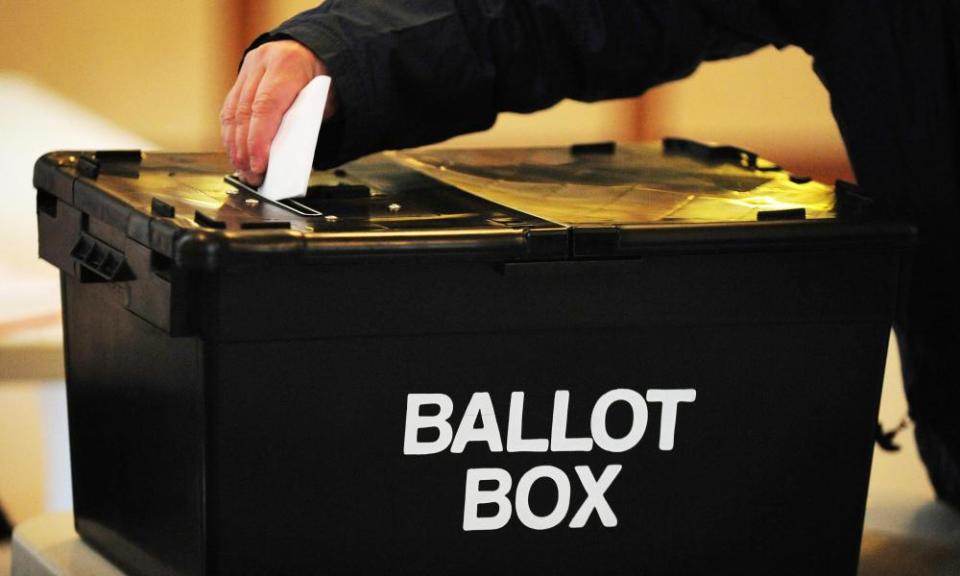Andrew Rawnsley’s A to Z of Brexit

A IS FOR ASTRONAUTS
Space, the final frontier. As a contingency against Brexit going horribly wrong, the government hopes to go where no government has gone before and seek out new worlds and new civilisations. Ministers will be presenting a space industry bill giving them the power to license spaceplanes and spaceports. So if he fails to secure the frictionless borders with the EU that he seeks, Liam Fox can try his luck negotiating free trade agreements with extraterrestrials.
B IS FOR BORIS JOHNSON
Once and likely future pretender to the Tory crown whose denials of interest in Mrs May’s tottering throne are strangely disbelieved by everyone. Some Boris-backers in his party argue that their next leader needs to be a Tory who campaigned for Brexit in order to persuade the Conservative party to swallow a less stark version of withdrawal which prioritises protecting the economy. Johnsonphobes say no one in Europe takes him seriously. They also point to a shambolic turn on the BBC last week. Under interrogation by the excellent Eddie Mair of Radio 4’s PM programme, the foreign secretary registered a 10 on the internationally recognised Abbott scale of car crash interviews.
C IS FOR CITIZENS’ RIGHTS
The future status of EU citizens in Britain and Brits living in the EU27 is a crucial zone of contention in the opening skirmishes of the negotiations. Mrs May made what she called a “bold and generous offer”. The commission sniffed that it was “insufficient”. Behind the posturing, both sides agree on the imperative to reach an agreement granting reciprocally recognised rights to the millions affected. That doesn’t mean getting there will be easy.
D IS FOR DEEP (AND SPECIAL) RELATIONSHIP
What the government says it wants with the EU after the break-up. Darling, it’s me, not you. What the prime minister also suggested that she had with the Democratic Unionist party until it began bargaining over the price of its support in Westminster. The 10 Unionist MPs will be critical in keeping the Tory minority government on the road and in knife-edge, Brexit-related votes in the Commons. The Unionists are already fuming that the Tories are taking them for granted; the Tories are already harrumphing that the DUP is too greedy. This is a pointer to just how vulnerable the government will be in parliament where it will be at risk of ambush and defeat at each stage of the Brexit process by combinations of Tory rebels, opposition parties (see Holyrood and Jeremy Corbyn) and stroppy peers (see Lords).
E IS FOR EMERGENCY BRAKE
An idea for curbing immigration that David Cameron used in his doomed attempt to make the EU more palatable to swing voters. The UK would be granted some power to curb surges of immigration while still retaining effective membership of the single market. Some Labour people have promoted an alternative notion: migration to be restricted to those who have a job offer in Britain. The EU might regard this as an example of Britain trying to “have its cake and eat it” (See Boris).

F IS FOR FIGHT OF THE SUMMER
This is what David Davis, the Brexit secretary, had been promising us. Before last week’s opening of the formal bargaining, he predicted that the first clash would come over the EU’s refusal to talk about trade until there had been sufficient progress on the UK’s payment for its outstanding budget obligations. The negotations began with an immediate capitulation by the British side on this sequencing question, a retreat which underlined a brute fact about the relative strength of the two sides. The UK needs a deal more than the EU needs a deal.
G IS FOR GREAT REPEAL BILL
The main piece of eight Brexit-related items of legislation which the government hopes to get through parliament. The “Great” now appears to have been dropped from the bill’s title. It was always a misnomer. The legislation will repeal the European Communities Act of 1972 which took Britain into the then Common Market, while also translating all EU law into British law so that it can be kept, amended or scrubbed at later leisure. This legislation will present a host of opportunities for the government’s opponents to make trouble for ministers.
H IS FOR HOLYROOD
Home of the Scottish parliament and another potential spanner in the Brexit works. Under the Sewel convention, some elements of Brexit legislation may require Holyrood’s approval. Scottish Nationalists think that the Edinburgh parliament has a veto and threaten to wield it if control of areas such as fisheries and farming are not devolved. Lawyers have advised ministers that it is not yet clear if this is the case. Nor do they seem sure what happens if Holyrood says no.
I IS FOR IRISH BORDER
Another key challenge for early stages of the negotiations. Everyone agrees that it will be undesirable to have a “hard border” between Northern Ireland and the Republic. This is a big concern for the Tories’ partners in the DUP. What no one seems to have satisfactorily settled yet is how that aim can be made compatible with the government’s current version of Brexit which involves leaving the customs union.

J IS FOR JEREMY CORBYN
With a minority Tory government embarked on such a momentous and fraught endeavour, the role of the opposition will be pivotal. Labour’s ambiguity about crucial aspects of Brexit served it well during the election, when it managed to attract support from both Remain and Leave voters. This unstable coalition will be tested by the fierce debates to come. Some Labour people suggest that they would be willing to co-operate in trying to make a success of Brexit if the Tories moderated their position. The signs from the Labour leadership are that they aren’t interested in any collaboration and would rather try to hang “Tory Brexit” around the government’s neck.
K IS FOR KAMIKAZE SCENARIO
The result of no divorce agreement. The UK would be released from all EU treaties. It would also have nothing to replace the thousands of international deals that flow from them. Philip Hammond, the chancellor, calls this a “very, very bad outcome”. Severe and widescale disruption would hit businesses and consumers as tariffs are imposed and trade gums up at borders.
L IS FOR LORDS
Most peers are hostile to harder versions of Brexit and the government has no majority in the upper house. Under the Salisbury convention, peers will not resist a government when it is implementing manifesto policies. The failure of the Tories to win a Commons majority makes it moot whether that applies.
M IS FOR MAY, MRS
In old Tory use, synonym for the new Iron Lady, Gloriana, Boudicca and strong ’n’ stable. Rapidly redefined since she misplaced their majority at the election. In new Tory use, synonym for mayhem, walking dead, lame duck and weak ’n’ wobbly.
N IS FOR NORWAY OPTION
Old idea given new life by the election result. In this soft version of Brexit, Britain repatriates some powersfrom Brussels, but retains membership of the European Economic Area and remains within the single market for most intents and purposes. The Cityand many businesses would like this, but it would require a continuing financial contribution to the EU and the acceptance of most of its rules.
O IS FOR OPEN BREXIT
Favoured by the Tory leader in Scotland, Ruth Davidson. Another way of saying Soft Brexit. Just as Clean Brexit is really just another way of saying Hard Brexit. See also A Red, White and Blue Brexit (T May), A Workers’ Brexit (J Corbyn) and A Dog’s Brexit (I’ve just made that up).

P IS FOR PAYING UP
Divorce is usually expensive. Estimates of what the EU wants by way of a separation payment rise to a net tab of €75bn (£65.6bn). Ministers insist they will not cough up that sum, but have not said what they might agree to. Just one cent will enrage some Tories.
Q IS FOR QUEEN’S SPEECH
A budget version this year, with cut-down pomp – rather appropriate in the reduced circumstances in which the government finds itself. There won’t be a Queen’s speech at all next year on the grounds that the government needs an unusual double parliamentary session to get all the Brexit legislation through.
R IS FOR RASPBERRIES
and other soft fruits, which will cost up to 50% more after Brexit if tighter immigration controls prevent seasonal workers coming into Britain to pick the produce. So warns British Summer Fruits, the industry body. Stand by for complaints about the price of strawberries and cream when Brexit angst hits Wimbledon.
S IS FOR SABOTEURS
Abusive term of choice in the Brextremist press to attack anyone with the temerity to mention the disadvantages of hard Brexit. Mrs May’s election gambit was hailed as an opportunity to “crush the saboteurs”. That went well, didn’t it?
T IS FOR TRANSITIONAL ARRANGEMENT
Regarded by the Treasury and many others as vital in order to minimise the economic disruption of Brexit, this would mean that Britain only slowly extricated itself from many aspects of the EU. Transitional arrangements can turn into permanent ones, which is why the notion is viewed with narrow-eyed suspicion by many hard Brexiters.
U IS FOR UKIP
The plum-and-custard brigade were obliterated at the election, but Ukip could revive on the back of voters angered by a diluted, delayed or ditched Brexit. Nigel Farage has hinted that he might be up for a third tour – or would that be fourth?
V IS FOR VOTERS
Bloody voters. The electorate is ultimately to blame for casting Britain adrift in an ocean of uncertainty. Voters narrowly chose to instruct politicians to take Britain out of the EU in the 2016 referendum. Then the country declined to give Mrs May a mandate to pursue her type of Brexit while producing a parliament without any clear consensus for any other version. Bloody voters.

W IS FOR WORLD TRADE ORGANISATION
In the event of Britain departing with no deal on trade, we would default to the rules set by the World Trade Organisation. Hard Brexiters argue that this would not be so terrible. Many businesses say it would mean a nightmare as tariffs and non-tariff barriers were erected between UK and EU trade.
X IS FOR KISSES
still being blown across the Channel from some on the continent. Donald Tusk, president of the European Council, recently voiced the hope that Britain might change its mind. The election result has emboldened some British Remainers to believe the battle is not over yet. Breversal would require a decisive shift in public opinion and a government willing to hold a second referendum and able to win it in order to overturn the result of the first.
Y IS FOR YOUTH
The pro-Remain young were overwhelmed by the pro-Leave old in the referendum. Many young voters have said that their anger animated them to seek their revenge on the Tories in the recent election. What goes around comes around.
Z IS FOR ZERO HOUR
That would be 29 March 2019, when the UK is scheduled to leave the EU, deal or no deal. If there is an agreement, it will need to be wrapped up by the end of 2018 to leave time for approval by EU states and the European parliament. An extension is possible, but would require the unanimous consent of the EU 27. Time is not Britain’s friend. So thank goodness we have such a strong and stable government.

 Yahoo News
Yahoo News 
